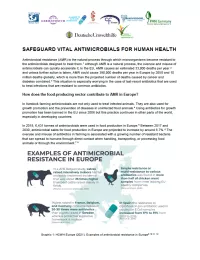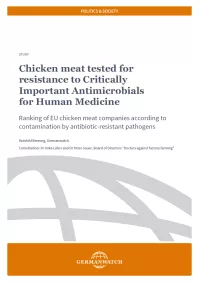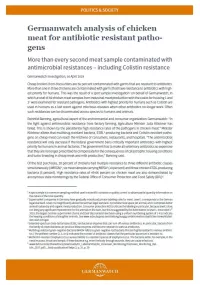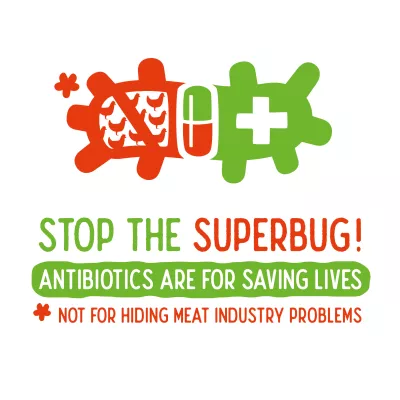Antibiotics in animal husbandry
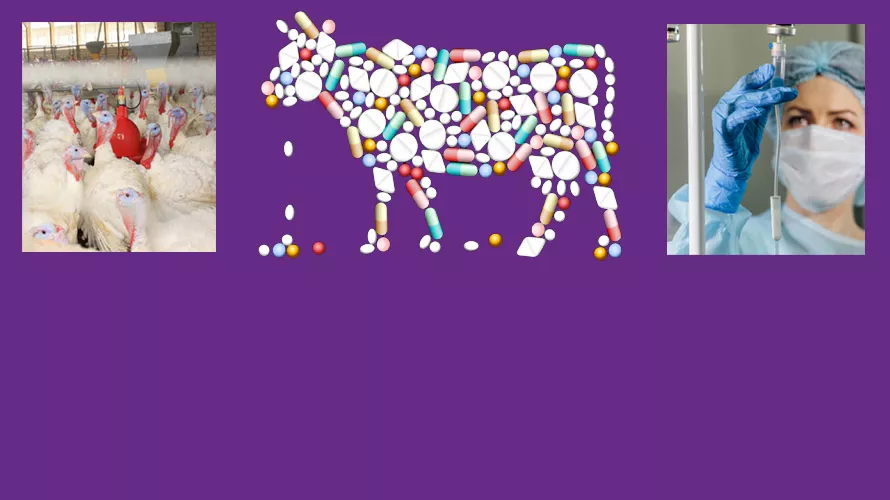
Antibiotics are indispensable for human and animal health. However, their effectiveness is increasingly at stake - already today, the development and spread of antibiotic-resistant pathogens is considered one of the greatest global health threats. At Germanwatch, we primarily keep an eye on the use of antibiotics in industrial livestock production and politically advocate stricter regulations as well as breeding and husbandry methods that are significantly healthier for the animals.
What is the fundamental problem?
▼
What is the fundamental problem?
▲
Antibiotics are essential for the treatment of serious diseases and as life-saving drugs. Preserving their effectiveness is considered one of the most urgent tasks in both human and veterinary medicine.
Careless, excessive and regular use or even misuse of antibiotics promotes the development of antibiotic-resistant pathogens that are spread by various routes. As a result, more and more antibiotics are threatening to become ineffective - diseases are becoming increasingly difficult or even impossible to treat.
Due to the already very critical situation, institutions such as the World Health Organization (WHO) speak of the beginning of a post-antibiotic era and a growing threat of pandemic proportions.
Antibiotics in industrial animal husbandry
▼
Antibiotics in industrial animal husbandry
▲
In addition to various challenges to improve the use of antibiotics in human medicine, the use of antibiotics in industrial livestock production is a major concern in the veterinary sector. The animals used there, which are bred for high performance and therefore susceptible to disease, and which are mostly kept in large herds, as well as other intensive husbandry conditions, lead to a high and regular use of antibiotics. These conditions are highly conducive to the development of antibiotic resistance.
Antibiotic resistance as a threat to humans
▼
Antibiotic resistance as a threat to humans
▲
Antibiotic-resistant pathogens, but also the active substances themselves, get into the environment (air, soil, surface water, groundwater) via the exhaust air from animal housing facilities and via spread liquid manure or fermentation residues. From there, they can be transferred to humans. The products of animal production, such as meat in particular, but also raw milk, have also been shown to be regularly contaminated with resistant germs. Antibiotic-resistant pathogens can also be transmitted to humans through direct contact with animals.
Pathogens transmitted to humans can either directly cause infections in humans that are difficult to treat or make effective antibiotic treatment of other infections difficult or even impossible. It becomes particularly threatening when pathogens become resistant to antibiotics of last resort. The "highest priority critically important antimicrobials" (WHO) should be classified as such antibiotics.
Antibiotika - Kernziele und Unterstützung
Our core objectives and activities
In principle, the prudent use of antibiotics must be constantly promoted and monitored. Incorrect or abusive use of antibiotics must be counteracted and prevented. With regard to industrial livestock production, we focus on the following objectives:
- Antibiotics classified by the WHO as " highest priority critically important antimicrobials" (HP CIA) must be excluded from use in industrial livestock production.
- Reduction of the general use of antibiotics in livestock production, in particular through significantly improved approaches and measures in the area of animal breeding and husbandry. Existing husbandry systems must be redesigned, especially with regard to animal health. This will also include on-farm as well as general livestock reduction.
- Effective implementation of the EU Regulation 2019/6 on veterinary medicinal products and national antibiotic resistance strategies, especially with regard to antibiotics of last resort, including sufficient and transparent monitoring and controlling systems.
- Strict and effective implementation of at least the target of the Farm to Fork Strategy to reduce European antibiotic use in animal husbandry by 50 % by 2030.
To achieve these goals, we at Germanwatch focus on the following activities:
- We prepare information in the form of articles, lectures, (press) releases and background papers.
- We raise public awareness on the issue of antimicrobial resistance (AMR) from animal husbandry.
- We monitor political processes around the topic, identify and work on important leverage points to minimise the use of antibiotics in animal husbandry and to preserve the efficacy of the most important antibiotics for humans.
- We are building an action-oriented Europe-wide network on the topic, promoting interdisciplinary exchange and cooperation between organisations from a wide range of fields, including human medicine, veterinary medicine, environmental protection and development cooperation.
- We examine legal options to promote protection against antibiotic resistance and uncover health risks from industrial animal husbandry through research and laboratory testing.
What can you do?

Stay informed and subscribe to our newsletter. In addition to many other Germanwatch topics, we will keep you up to date on our antibiotics work.

Talk to others about the topic "Antibiotics in industrial livestock production" and help to create more awareness for it.

Support us in our daily work against the threat of antimicrobial resistance from animal husbandry with a donation. Even (regular) small amounts help us to keep putting the issue on the political agenda.
Together we can bring about a change in the use of antibiotics and, not least, initiate major changes in animal breeding and husbandry.
Latest (press) releases and publications
A so-called delegated act is currently being discussed at EU level, which is to provide criteria for the designation of antimicrobials that are reserved solely for humans and can then no longer be used in animal husbandry. On 15 September, the EU Parliament will decide on an objection to this delegated act. In essence, the objection provides for the delegated act to be revised again so that antimicrobials that are most important for humans ("critically important antimicrobials with the highest priority", WHO) can also be included in order to preserve their effectiveness.
Germanwatch discloses: Chicken meat from the PHW-Group, Germany's largest poultry company, is almost 60 percent contaminated with antibiotic-resistant pathogens. This is the result of a Germanwatch study in which chicken meat samples from the three largest EU producers were tested in the laboratory. Every third sample even showed resistance to reserve antibiotics. These are emergency antibiotics that people need when other antibiotics no longer help. The more resistant pathogens are introduced into the food chain and into our kitchens with chicken meat, the greater the health risk that these last-line antibiotics will lose their effectiveness.
Antibiotics in intensive animal husbandry - after years of efforts by the German government, this should no longer be a cause for concern. But unfortunately it is, as a study by Germanwatch shows: More than every second chicken in discounters is contaminated with antibiotic-resistant pathogens. Every third chicken meat sample was contaminated with germs that have resistance to antibiotics with highest priority for humans.
Real name
Antibiotika in der Tierhaltung - Zusatz-Infos
Spendenstichwort:
ANTIBIOTIKA retten
Germanwatch e.V.
Bank für Sozialwirtschaft AG
IBAN: DE95 3702 0500 0003 2123 23
Bildnachweise: Titel links „Putenstall“ von Uschi Dreiucker/Pixelio; Titel Mitte „Antibiotika-Kuh“ von Peter Hermes Furian/Fotolia; Titel rechts „Intensivstation“ von Satyrenko/Fotolia; sonstige Bilder von Germanwatch e.V.

